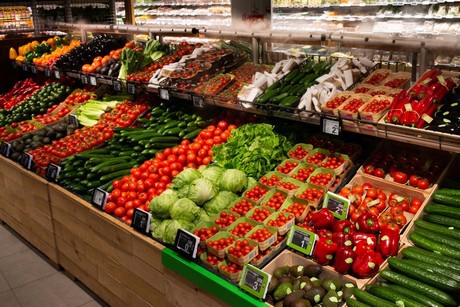After a successful test in the fruit and vegetable department of an Albert Heijn supermarket in Hoofddorp, the Netherlands, AH will start offering even more fruit and vegetables without plastic in shops and online. They’ll start with bananas (five bananas that were previously in a bag), sweet red pointed peppers, all types of bell peppers and bunched carrots. Eventually, more fruit and vegetables will be added to this assortment. The trial period in Hoofddorp will also be extended to gain even more experience in the field of quality and shelf life in cooperation with the customers.

Quality and shelf life
In more than 150 shops, and this number will only increase, Albert Heijn now uses ‘dry misting’: a fine spray of water that increases the shelf life of the vegetables. During the test in Hoofddorp, the combination of dry misting and no plastic packaging was to the benefit of quality and shelf life for bananas, sweet red pointed peppers, all types of bell peppers and bunched carrot. Other products are still being tested for quality and to combat food waste. Albert Heijn therefore extends the test to also gain experience with current seasonal fruit and vegetables. Alternative packing materials are also being tested. Dry misting also has a good effect on products packed in plastic, for that matter; it cools the products so that their shelf life is extended, combating food waste.
Making packaging more sustainable
In 2025, Albert Heijn will reduce its packing material by 25 per cent, and they’re having plenty of talks with their suppliers and permanent growers to get even more plastic-free fresh produce in their shops, without losing sight of food waste. Major strides have already been taken in other categories (such as soft drinks, meat and dairy):
- Top-seal packaging instead of a rounded lid resulted in 300,000 kilos of plastic saved in soft fruit;
- Replacing the lid of cheese with top-seal resulted in 117,000 kilos of plastic saved;
- 209,000 kilos of plastic saved in AH Basic water bottles.
The best packaging is a packaging that results in an impact on the environment as small as possible throughout its life cycle (from raw material to waste). Besides reducing packaging material, three other pillars are also central in AH’s policy: reuse (for example, the AH fresh bag), recycle (in 2020, all own brand soft drink bottles and non-perishable juices will be packed in at least 50 per cent R-PET. In 2018, they started with all 1 and 1.5-litre bottles of non-perishable juices). Renewing is the third pillar (AH Puur packaging for laundry detergent is already being made from sugarcane). All information, with even more figures and current examples, can be found on www.ah.nl/duurzaam and in the 2018 sustainability report (both links to Dutch articles).
